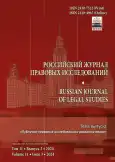Принципы реализации дискреционных полномочий органов публичной власти: система и конституционно-правовое содержание
- Авторы: Раджабова Е.А.1
-
Учреждения:
- Воронежский государственный университет
- Выпуск: Том 11, № 3 (2024)
- Страницы: 15-24
- Раздел: Актуальная тема
- URL: https://journal-vniispk.ru/2410-7522/article/view/284796
- DOI: https://doi.org/10.17816/RJLS631852
- ID: 284796
Цитировать
Аннотация
Цель исследования состоит в обосновании необходимости выстраивания современной системы принципов дискреционных полномочий органов публичной власти как необходимой основы механизма их реализации. В рамках данной работы был проведен обзор принципов осуществления дискреционных полномочий, закрепленных в международных и национальных правовых актах; выделены основные принципы (верховенства права, законности, разумной сдержанности, равенства, правовой определенности, объективности и беспристрастности, соразмерности и др.), проанализировано их конституционно-правовое содержание. Особый акцент сделан на необходимости выстраивания системы принципов в механизме реализации дискреционных полномочий. Предложена следующая классификация:
1) фундаментальные принципы (принципы верховенства права и законности, которые имеют основополагающее значение в формировании правового института дискреционных полномочий);
2) общие принципы (принципы использования дискреционного полномочия с надлежащей целью, равенства перед законом, объективности и беспристрастности, разумного времени принятия решения);
3) специальные принципы (принципы пропорциональности, конституционной сдержанности). Кроме того, отдельно выделен принцип пруденциальности, который на сегодня не закреплен в национальном законодательстве, но применяется в практике деятельности ряда органов.
Вывод. Правовое установление и практическое применение вышеназванных принципов в деятельности органов публичной власти позволит, с одной стороны, повлиять на характер и последствия взаимодействия соответствующих органов между собой, с другой — создать эффективные гарантии прав, свобод и законных интересов граждан (прав и законных интересов организаций) от злоупотреблений и произвола.
Полный текст
Открыть статью на сайте журналаОб авторах
Елена Анатольевна Раджабова
Воронежский государственный университет
Автор, ответственный за переписку.
Email: rajabovae@yandex.ru
ORCID iD: 0009-0006-0465-5540
соискатель ученой степени кандидата наук
Россия, ВоронежСписок литературы
- Хорунжий С.Н. Дискреционные полномочия федерального законодателя в сфере электоральных отношений: конституционно-правовой аспект // Гражданин. Выборы. Власть. 2021. № 3(21). С. 52–65. EDN: ZSOOPH
- Раджабова Е.А. Границы дискреционных полномочий органов публичной власти (статья, занявшая второе место на IV Всероссийском конкурсе студенческих работ по административному праву и процессу) // Административное право и процесс. 2020. № 9. С. 81–84. EDN: VPXAXB doi: 10.18572/2071-1166-2020-9-81-84
- Зорькин В.Д. Верховенство права и конституционное правосудие // Журнал российского права. 2005. № 12(108). С. 30–36. EDN: OPCVBL
- Джавакян Г.З. Принцип разумной сдержанности в конституционном правосудии: самоограничение или самоустранение? // Конституционное и муниципальное право. 2018. № 6. С. 54–61. EDN: XQXZBJ
- Хорунжий С.Н. Пропорциональность как самостоятельный Конституционный принцип // Конституционализм и государствоведение. 2022. № 2(26). С. 9–24. EDN: BYSKWJ
- Соловей Ю.П. Принципы осуществления публичной администрацией дискреционных полномочий // Административное право и процесс. 2018. № 7. С. 5–15. EDN: UTNPWY
- Раджабова Е.А. Конституционные основы дискреционных полномочий органов публичной власти // Наукосфера. 2021. № 11–2. С. 223–226. EDN: TYRZOX
- Ярков В.В., Абущенко Д.Б., Брановицкий К.Л., и др. Актуальные проблемы гражданского и административного судопроизводства. Москва: Статут, 2021. 460 с. EDN: KXHDME
Дополнительные файлы







